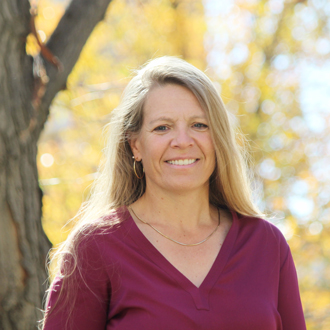Center for Environmental Stressors on Occupational Safety and Health
Keeping workers and their communities safe, healthy, and productive in the midst of changing work environments.
The Center for Environmental Stressors on Occupational Safety and Health is an interdisciplinary group of researchers and public health practitioners whose mission is to play a proactive role in identifying and promoting resilient workplaces, workforces, and communities. We are dedicated to keeping workers and their families safe, healthy, and productive by preventing and reducing health impacts from the effects of changing work environments and exposures.
This center emphasizes research and educational opportunities that gather passionate individuals eager to make change in this field.
The team

Katherine James PhD, MS, MSPH
- Center for Health, Work & Environment
- Community Epidemiology & Program Evaluation
- Department of Environmental & Occupational Health
- Department of Epidemiology
- Rocky Mountain Prevention Research Center
Dr. Katherine A. James is an engineer and epidemiologist whose work focuses on the environmental and climate-related determinants of health in rural and underserved communities across the Mountain West. With formal training in biological and environmental engineering (BS, MS) and a PhD in Epidemiology, she leads a robust research portfolio examining the cardiometabolic, renal, and developmental health impacts of arsenic, cadmium, and other metals. Dr. James is Principal Investigator of a large NIH R01 investigating how drought influences arsenic exposure and cardiometabolic outcomes in an aging rural population, and she directs multiple complementary studies on chronic kidney disease, maternal metal exposure and adverse birth outcomes, and community-level health disparities. Dr. James is Co-Lead of the NIH-funded Mountain West PACE-H (Partnerships in Action toward Community Health) Hub, a regional center focused on advancing climate and environmental health equity through community-driven research, training, and capacity-building. Through this Hub, she supports the development of sustainable, place-based strategies that strengthen climate resilience and reduce environmental health risks across rural and tribal communities in the Mountain West. She is also Principal Investigator of the Attitudes and Behaviors Survey (TABS) within CEPEG, conducted in partnership with the State Tobacco Education and Prevention Partnership (STEPP) at the Colorado Department of Public Health and Environment—an ongoing statewide surveillance initiative that monitors tobacco, nicotine, and cannabis-related behaviors and perceptions among Colorado adults. Through TABS, she leads analyses that inform state policy, prevention programs, and public health communication strategies. With more than two decades of community-based research experience in the San Luis Valley and throughout the region, Dr. James is deeply committed to transdisciplinary science, climate resilience, and environmental health. Her current efforts, including NIH-funded community-engaged projects on drinking water quality, drought, and cardiovascular health, emphasize sustainable partnerships, Total Worker Health®, and equity-centered approaches that bridge environmental science, epidemiology, and community priorities.
Areas of Expertise
- Community-Engaged Research
- Environmental Metals Toxicity
- Climate and Extreme Weather Health
- Rural Health
- Agriculture Worker Health
- Student Mentorship and Training
Education, Licensure & Certifications
- PhD University of Colorado, Anschutz Medical Campus, Epidemiology, 2010
- MS University of Colorado, Boulder, Civil/Environmental Engineering, 2002
- MSPH University of Colorado, Health Sciences Center, Public Health, 2000
- BS Virginia Polytechnic Institute & State University, Biological Systems Engineering, 1996
Awards
- 2022: Faculty Award for Excellence in Research, Colorado School of Public Health
- 2022: Selected for the Climate Change, Health Equity, and Public Health Law Learning and Practice Collaborative
- 2021: Alpha Upsilon Chapter of the Delta Omega National Honorary Society in Public Health
- 2021: Selected Climate for Health Ambassadors Community, EcoAmerica
- 2019: Selected for the NIH/NSF sponsored Data Innovation Lab on Environmental Health in Rural Populations
- 2018: Dean’s International Travel Award Colorado School of Public Health
- 2013: Selected for the Early Career Women in Medicine Leadership Conference July 2013
- 2012: Faculty Development Award Children’s Environmental Health Center, National Jewish Hospital
- 2011: American Academy of Neurology Conference, Selected as a top abstract for presentation by the scientific chair, Dr. Stefan Pulst, in the “Scientific Program Highlights Plenary Session”.
- 2000: Awarded Travel Scholarship Royal Society Hygiene and Tropical Medicine to travel to the Republic of Mauritius for environmental research and training.
- 1998: Dennis Burkitt Fellowship, Royal Society of Tropical Medicine and Hygiene
Affiliations
- Member, International Society of Environmental Epidemiologists
- Member, Society of Toxicology
- Member, International Society of Exposure Science
- Member, CU Climate Consortium
Students
Courses
Climate and worker health class, runs in the Spring.
Capstone & practicum
Stay tuned for more details on these projects.
PhD candidates
The Environment + Worker Health and Safety Targeted Research Training (TRT) program supports future leaders in the field of environment and workforce health by receiving high-quality education and research training in addressing the short- and long-term impacts of climate change on occupational health. Trainees in this program will join a forward-thinking faculty and student cohort to address one of the most urgent challenges we face today in public health.


